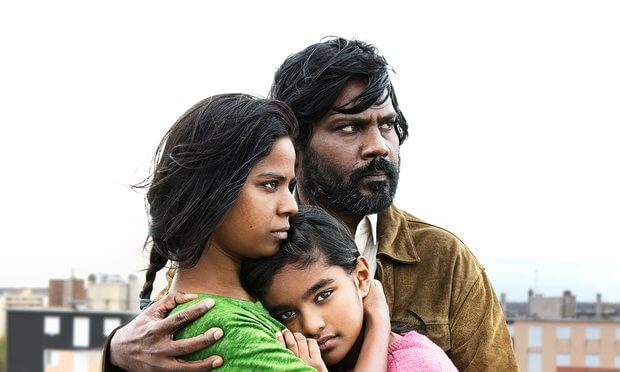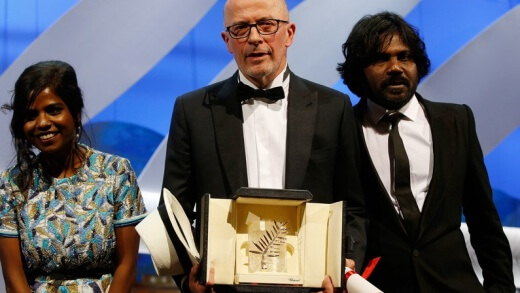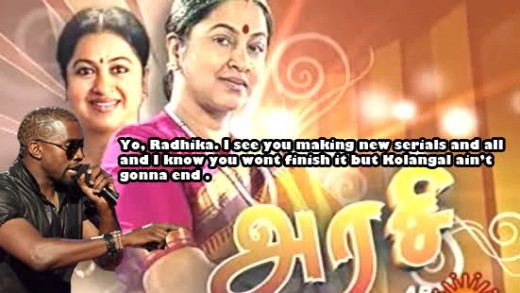Dheepan functions, if at all, under a farcical and literary set-up that starts with Yalini, hair messy and shirt hanging off the shoulder, running through makeshift tents and crowds of people until she finds an orphan that will help her get out of Sri Lanka. She brings the freshly orphaned girl and enters a tent where Dheepan, played by Anthonythasan Jesuthasan, waits and an LTTE solider hands them passports of a dead family, thus forming a new family of strangers.
But what is a family of people if not a bunch of strangers who come into each other’s lives and continue bonds by way of love, or blood, or care, or need, and dependence. With all of their families decimated, Dheepan, Yalini, and their new “daughter” Illayal leave their past that, now, only remains in their memories.
Taking on the identities and names of the dead is fitting in that the family and actors simply are ghosts—things you hear about and never see, but you make up stories about and start to believe it’s true. They are nothing but Audiard’s apparitions, empty and lacking any depth.
Look at what I found is the most appropriate way to explain Audiard’s approach. In an interview with The Guardian, he describes this fascinating approach: “Then Noe Debré, one of Dheepan’s co-writers, announced that he had met some Tamils and brought Audiard up to scratch on the Sri Lankan civil war, which he says received little coverage in the French media. That got Audiard researching his theme. ‘There is a Tamil community in Paris, but not a very big one, and it’s still experiencing all the tensions of the conflict. They’re a little paranoid. It’s hard to really get to know them.’” His theme.
Audiard’s comments, in 2015, sounding the way colonizers like John Smith might’ve described his encounters with “Indians,” expresses what Edward Said describes as Orientalism, “discussed and analyzed as the corporate institution for dealing with the Orient—dealing with it by making statements about it, authorizing views of it, describing it, by teaching it, settling it, ruling over it; in short, Orientalism as a Western style for dominating, restructuring, and having authority over the Orient.”
Audiard uses the backdrop of the Sri Lankan civil war without really ever talking about what the war is about and why Yalini, Dheepan, and Illayal are running away from their home country and why their families are dead – only to assert his own authority and power that his career has afforded and awarded him. Dheepan watches an English news report on a laptop in Paris of the slaughters and escalation of war back home, but the camera is tilted and the only a fragment of the screen can be viewed.
Audiard fails and rejects a direct confrontation with the historical context of the people he depicts, instead giving priority to romance and percolating criminal misdeeds. Audiard does not see Tamils as fellow human beings but as subjects, objects, and themes that he sees as other from himself and, as a result, fails to meaningfully engage with us. That, or they were really hard to get to know.
In the middle of the film, after Yalini and Dheepan have slept together, in a scene that shows that Tamil female sexuality exists and has needs of its own, she tries to run away to London with her passport. Dheepan finds her on the train platform and takes it from her, ceasing any chance of change and freedom. Back home, they fight:
YALINI: Let go of me or I’ll scream!
Pause. Yalini breathes heavily, Dheepan stares at her.
DHEEPAN: You were going to try and leave without Illayal?
YALINI: Yes.
DHEEPAN: You’re able to leave without her?
YALINI: What’ve you been thinking? Have you started to believe that this story is true? Huh? Am I her mother? Is that how she thinks of me? You’re not my husband, Dheepan. And I’m not your wife. And she’s not our daughter! (Pause. Dheepan walks to the kitchen and drinks a glass of water. She stands in the doorway.) Tell me. Tell me again. What?
DHEEPAN: I’m not moving away from here.
Yalini attempts to run away from the performance of a nuclear family, one that she finds herself unfit for as tensions between her and Illayal begin to cause a strain at home and her inadequacies encroach on her. But Dheepan cannot function alone without her. What man could? For the patriarch of the family to function in the environment without his “wife” and “daughter” would create the exact same instability the war did on his nuclear family and harm his patriarchal control. Their pasts are still fresh in their minds, Yalini having not been married before and Dheepan having had a wife and two children, and the performance of the nuclear family is Dheepan’s only way to keep in touch with his past and his sanity.
Yalini doesn’t need Dheepan-she has London-but she sees that without her he cannot function and she stays. She halts her dream in order to continue to live in his. Even when he returns her passport to her before the third act, she decides to wait to go with him—his needs becomes her needs.
My mom, who wed in an arranged marriage, sometimes makes a joke at parties and social gatherings that some people love before marriage but that for her love came after marriage. She snickers. Perhaps, like my mother, Yalini, too, cannot resist the idea of the nuclear family that gives her access to Paris away from war and death, and to be pulled into it is inevitable. She is not in the right place and circumstance to envision something else for her future, but perhaps her child is.
This is the moment in the film when the thin strings that holds the family together beings to unravel, beginning Dheepan’s own unraveling. Dheepan rejects joining the LTTE movement in Paris, repeating to a former leader, “For me, the war is over!” He rejects the institution of power that gave him an identity and purpose, and his wife rejects the relationship that they both have started to believe—Dheepan’s trauma begins to surface because he has nowhere to project his masculinity and pain, neither the war zone nor Yalini’s body. When you start to believe in the lie that you have created, where does the truth lie?
In Black Label.
To Be Continued…

 Nirris Nah
Nirris Nah









